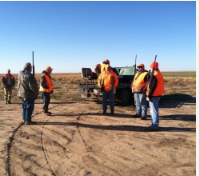
By Johanna Hecht
KU Statehouse Wire Service
TOPEKA – Lawmakers are discussing a state constitutional amendment to protect Kansans’ right to hunt, fish and trap wildlife, with the hope the issue can be put on the ballot in November.
The Senate Federal and State Affairs Committee held a hearing Wednesday on House Concurrent Resolution 5008, which passed the House 117-7 on Feb. 22. If approved, the amendment would help ensure the protection of hunting, fishing, and trapping rights for generations to come, supporters say. The Committee Report recommended the resolution be adopted by Committee on Federal and State Affairs
The Kansas Bill of Rights currently states: “A person has the right to keep and bear arms for the defense of self, family, home and state, for lawful hunting and recreational use, and for any other lawful purpose.”
The proposed amendment gives people the constitutional right to hunt, fish and trap “including by the use of traditional methods, subject to reasonable laws and regulations,” and it says that “public hunting and fishing shall be the preferred means of managing and controlling wildlife.” The bill does not define traditional methods.
Travis Couture-Lovelady, state liaison for the National Rifle Association (NRA), says the bill would ensure future wildlife conservation and management decisions are based on scientific research in order to preserve Kansas’ hunting heritage.
“I don’t care about tomorrow. I want to do things for the benefit of Kansans 50 and 100 years from now, and I think that is what this (amendment) will do,” said Christopher J. Tymeson, the chief legal counsel for the Kansas Department of Wildlife, Parks and Tourism.
Currently, 19 states have adopted some form of hunting, fishing and trapping rights, the National Conference on State Legislatures (NCSL) reports. Proponents of such amendments believe they are necessary because of “increasing urbanization, decreased habitat, declining numbers of sportsmen, and more restrictions on hunting,” NCSL reported.
States that have not adopted constitutional protection for hunting are beginning to see the negative effects, supporters said.
Couture-Lovelady explained that he works with Colorado government leaders who wish the state had put similar provisions in its constitution before the state became urbanized. This urban population doesn’t understand or value hunting traditions, he said, and a recent surge in wildlife population is causing Colorado legislators to revisit current trapping bans.
However, Tymeson told legislators a constitutional amendment may face opposition.
“There is a potential that this issue could serve as a rallying cry for anti-hunting, fishing, and trapping groups, where none currently exist in Kansas,” Tymeson said.
He also warned that opposition might come from individuals who view this as a firearms issue.
Rep. Sydney Carlin, D-Manhattan, who voted in opposition of the bill on Feb. 22, said it is rare for a constitutional amendment to pass, mainly because it’s costly. She says she doesn’t understand the purpose of the bill since Kansans already have the right to hunt and fish.
“I just didn’t think it raised itself to the level of necessary constitutional change,” Carlin said.
Sen. Oletha Faust-Goudeau, D-Wichita, has raised concerns about how the amendment would be placed on the ballot.
“It’s a presidential election (year), and you’re going to have a lot of names on that ballot, and we have talked about voters having fatigue voting where they don’t go all the way down (on the ballot),” Faust-Goudeau said.
She feels it is important to include the necessary critical language but that “less is best” in this case.
Secretary of State Kris Kobach estimates that HCR 5008 would require approximately $30,000 from the state’s general fund. Additionally, counties would be required to spend a total of $76,000 for ballot programming costs.
The bill will move to the full Senate and must pass by a two-thirds majority vote. If approved by the legislature, the amendment would be placed on the Nov. 8 ballot for approval by voters.
Edited by Leah Sitz
